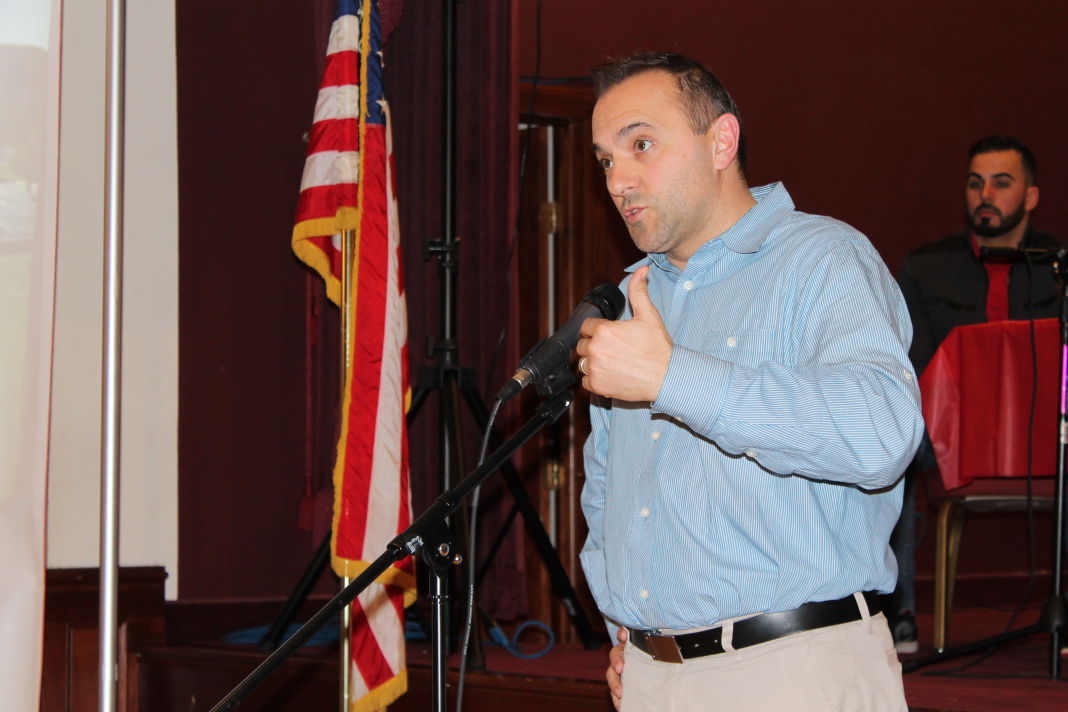A Feb. 26 public hearing revealed a generational divide within Mineola’s three Portuguese groups on the question of whether they should merge, two of their leaders said.
Younger members favor unifying the Mineola Portuguese Center, the Portuguese Heritage Society and the Alheirense Cultural Center and building a larger facility to attract youth and keep Portuguese culture alive, they said.
Older members, on the other hand, wonder whether a merger is financially feasible and whether the community would ultimately divide again, said Lucia Cunha, president of the Portuguese Heritage Society.
“I have the feeling that they’re going to agree at the end, but it’s going to take a while,” Mineola Portuguese Center President Frank Teixeira said.
The hearing, conducted mostly in Portuguese at the Mineola Portuguese Center on Jericho Turnpike, drew more than 100 people in the first step toward what could be a long merger process for the groups.
The clubs’ leaders called the hearing to gather feedback about a merger after formulating the idea in the fall, Cunha said.
It featured a presentation from Ray Boa and Jorge Sousa of the Portuguese Cultural Center in Danbury, Conn., which was formed in 2001 from the merger of the Portuguese American Club and Sons of Portugal Club there.
Combining the groups took three years of negotiations, Boa said, but resulted in a new $5 million, 42,000-square-foot facility and saved Sons of Portugal from shutting down.
Teixeira said Mineola’s groups may not be able to create a facility as large as Danbury’s, but the headquarters proposed under the merger could include a gym, ballroom, library, classrooms, study space, museum and coffee shop, as reported in December.
Some proponents said such a facility would keep youth interested in Portuguese culture and encourage their involvement in the community.
Without one, said Jamie Silva of the Mineola Portuguese Center, the clubs could risk dying out.
“(C)reating something like this, a library where they can go and learn about the history, a place where they can enjoy what you have all brought to this country, that’s what you need to start thinking about and really start focusing on,” Silva said.
Opponents of the plan questioned whether a merger would be financially feasible for the three groups, said Cunha, who was recently sworn in as the Portuguese Heritage Society’s first female president.
Some at the hearing asked questions about trouble the Portuguese Cultural Center, a 501(c)3 non-profit entity, encountered in its beginning and how it’s financially structured.
Another concern was the possibility of members becoming unhappy with how a unified group was run and forming their own groups, which was how the Portuguese Heritage Society was formed, Cunha said.
“If people who are in the club don’t like (its leadership), we’re going to wind up in the same place we are now with three clubs,” she said.
Cunha said she hopes the merger proceeds, but the hearing left her with the impression most people opposed it. Teixeira, though, said afterward he thought most people supported it.
Each individual club will now vote on the proposal, Cunha said. At least 80 percent of the members who vote must approve for the merger to move forward.
Boa said the hearing was “exactly the same” as the Danbury merger’s early stages. There was a generational divide there too, he said.
“The comments made were almost like a mirror image of what happened at our club,” Boa said.
The Portuguese Cultural Center had about 1,000 members after the merger, but membership has shrunk to about 500 in recent years due to a lack of Portuguese immigration and some of the population aging out, Boa said.
The fact that three groups would be merging in Mineola could create additional difficulties, he said, but they could be successful with a committee of “independent minds” leading the process.



